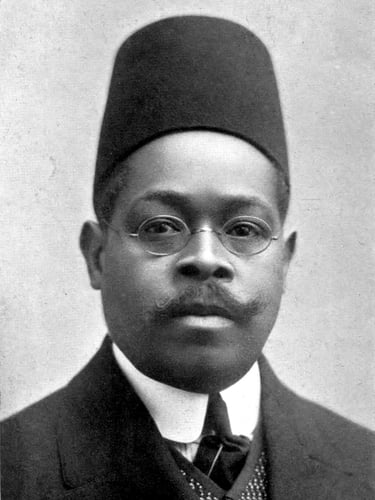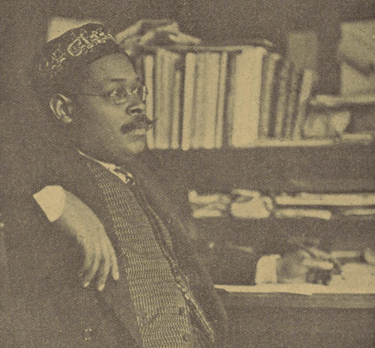

Dusé Mohamed Ali - Actor Activist and Writer
Dusé Mohamed Ali was born on the 21st November 1866 in Egypt. His father was an Egyptian army officer father, Abdul Salem Ali and his mother was from Sudan. At the age of ten he was sent to the UK to study at Kings College London with Captain Duse of the French Army whom his father had studied with at the French Military Academy. Mohamed Ali had hopes of studying to become a doctor however his aspirations were cut short when he had to return to Egypt because of the threat of war. In 1882, violence erupted in Mohamed Ali's birth town Alexandria, his father fought in the Egyptian military against the British.
Later that year, Ali’s father and brother were killed in a bomb attack during the Urabi Uprising, Muhamed Ali returned to the UK - he was just sixteen years of age. His father’s death had a profound impact and played a crucial role in shaping his anti-imperial stance.
Without financial stability Muhamed Ali began making a living as an actor in order to pay for his university tuition. . Whilst acting he also wrote. Muhamed Ali performed in London and toured in productions including Shakespeare’s plays Othello and the Merchant of Venice. He also wrote and produced his own plays one of them, A daughter of Judah, written in 1906 was well received.
Mohamed Ali eventually grew tired of being typecast in roles, however he persevered because his income from writing plays wasn’t guaranteed. As his interest in politics grew, Mohamed Ali started writing for regional newspapers as a freelance journalist. He also wrote for political publication The New Age and the feminist publication Freewoman. Many of his early articles focused on British policies towards native Egyptians and challenged British rule over Africa and Asia. In 1911 he published the book In the Land of the Pharaohs which was well received. In 1912 Mohamed Ali launched his own publication The African Times and Orient Review, which was the first newspaper in England owned and published by a Black person.


The publication introduced itself as a “a Pan Oriental, Pan-African journal at the seat of the British Empire which would lay the aims, desires, and intentions of the Black, Brown, and Yellow races- within and without the Empire - at the throne of Caesar.” The quarterly publication carried articles covering events and incidents from across the world that affected people of African, Asian and Arab descent and criticised racist colonial practices. The publication had worldwide readership and was popular whilst it lasted. Unfortunately, increasing costs and inconsistent advertising revenue resulted in the publication closing in 1920.
During the First World War Mohamed Ali founded the Anglo-Ottoman Society in London and the Indian Muslim Soldiers’ Widows’ and Orphans’ War Fund. In addition to community activism, he continued writing as a freelance journalist.
Mohamed Ali relocated to the United States during the 1920s before settling In Lagos in 1931 where he became the editor of the Lagos Times. In 1933 he founded Nigeria’s most popular magazine at the time, the Comet.
Dusé Mohamed Ali died in 1945.
Muhamed Ali at his desk 1913
Want information about written word jobs? Click HERE
